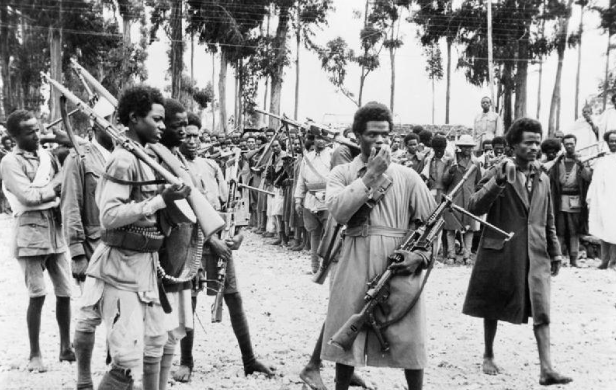
When the Nazis, in the cause of territorial expansion, invaded Poland and bombed Warsaw in September, 1939, the prompt declaration of war on the Third Reich by Britain and France must have come to many as unsurprising. Prime Minister Neville Chamberlain’s assurance of “peace in our time” no longer counted. Hitler had broken his nonaggression pact with the British, and the result was a world in flames. Soon the Japanese military would stunningly attack Pearl Harbour, compelling Theodore Roosevelt into drawing the battle line between America and Hirohito’s empire. The fascists had long taken power in Italy and Benito Mussolini had become one of Hitler’s strongest allies. The tide of the war swung in Germany’s favour once France surrendered, and the swastika was lifted high in Paris. Winston Churchill, the 1940 successor of Chamberlain as British PM, had inherited an explosive situation. The British Empire was threatened almost on all fronts, and they faced a peculiar trouble in Asia, no thanks to the all-conquering Japanese army. There was not enough manpower or instruments to respond to the Axis threat. And in no distant time, Britain was looking down at Africa for men, for sustenance, in a war in which legends would be made and myths dismantled.
A bulk of the African soldiers came from Nigeria, one of the darling colonies of the British Empire. The natives had different reasons for enlisting in the army. Some volunteered to fight for the British Empire because they longed for adventure in distant lands, others were simply picked up from the streets and their homes and thrown into the lorries of the conscription teams. The Nigerian novelist, Chinua Achebe, was a pupil when the conscription band invaded the mission school and took away his teacher, in broad daylight. Capturing the war years in fiction, Chukwuemeka Ike recounted how pupils were guided into bushes to harvest rubbers in the spirit of Win The War effort.
In January, 2013, I had an interview with Ichie Ignatius Ezeonyeka, a veteran of the Burma war. I arrived at his large homestead that morning in Umuchu, Anambra state, with Harmattan deeply entrenched in the air. He sat on a bench in the veranda of his bungalow, his walking stick right beside him. Within arm’s reach was a stool on which there was a bottle of gin. At 98, his body was frail but his mind gave away fascinating strength. “The war was fought from 1939 to 1945,” he told me. “I went there in 1941. We [the African soldiers] went there. On our way there, in the ship – there was no aeroplane – people were dying like fowls. Some of them [African soldiers] came with charms, but the powers in the sea subdued their charms. No charm works in the sea. All the powers in the world, they come from the sea. The ogbanje and others, when they die, they all go back to the sea where they came from. The powers in the seas are too much. Thieves don’t survive war. No rogue goes to war and survive.”
“During the war,” Ichie Ezeonyeka continued, “we all took our guns and started marching forward [toward the enemy]. You are not allowed to look back; why are you looking back, did you keep anything behind? You are not to cough. If you look back or cough, it means that you are a saboteur. The enemy is in front, so why are you looking back? If rain is falling, you don’t look for shelter; the rain will beat you very well; if the sun is shining, you are not allowed to hide anywhere. That’s why the British are better than us, they are more disciplined. We here, if small thing happens, we’ll start shivering.”
Barnaby Philips’ award-winning documentary, The Burma Boy, and 2014 nonfiction classic, Another Man’s War, captures with wide insight and introspection the story of Isaac Fadoyebo, who enlisted into the West African Frontier Force as a teenager and had the ill fortune of been gravely wounded in Burma during a Japanese onslaught. The 2012 Caine Prize winning story, Bombay’s Republic, by Rotimi Babatunde was about a Burma veteran
These men, drawn from all crooks and cranny of British West Africa, engaged in the legendary Burma campaign, an exercise in which thousands perished in the jungles of Asia. After many military defeats, the 82 Division of the West African Frontier Force British West African soldiers were able to salvage Burma from the claws of the Japanese Empire in 1945. That was the year Mussolini was murdered and hung in Italy, and Hitler and his mistress committed suicide in the Berlin bunker, their corpses burnt to the chagrin of the Soviet army. Two American atomic bombs were all it took to bring the irrepressible Japanese Empire to her knees.
On his reward for putting his life on the line for the British Empire, Ichie Ezeonyeka told me that he “wasn’t given anything. I heard other soldiers were getting money but I never got any money. I returned from the war in July 1945.”
The African soldiers that survived Hitler’s War returned with breath-taking tales and heightened pan-African view of their home politics. They had fought alongside their British comrades and “in the ‘green hell’ of the Burmese jungles, Africans discovered first-hand that the British were not infallible. The myth of racial supremacy was shattered and survivors were emboldened to think in new ways,” wrote Phillips. The generally accepted myth of White invincibility had been broken. These African soldiers would be ardent champions of nationalism and African independence.
Over the years, acknowledgement of the participation of Africans in the Burma campaign had waned. These men of valour would be dubbed as The Forgotten Army. The world celebrated the 70th anniversary of WW2 in 2015, and while the West adorned its heroes with accolades and worship, the silence of the African press was deafening. It appears that Africans, despite the activism of the 50s and 60s, still have little or no grasp of their history, no sense of appreciation of definitive moments. An hour that goes undocumented could be ruled out as non-existent; this annihilation of memory is the greatest scare confronting the African story. Almost all the highly informative and expository historic texts on African participation in WW2 were written in, and published by the west. Today, many Africans are unaware of the continent’s decisive involvement in North Africa and Asia during Hitler’s War. While some African intellectuals condemn the imperialistic gesture which sees the flourish of African artefacts in western museums and the continuous propagation of “white” values over local content, I wonder how many equally campaign hard for the improvement and upgrade of our institutions; for the thorough nurture and extensive support to art curators and historians. Has anybody investigated the destruction of the Mbari houses, the Igbo traditional museums, in Owerri by the former governor of the state Rochas Okorocha on account that the mud buildings are “fetish” as I was told. From time to time, the black man reinforces the argument that he is the wiper of his own heritage, the chief orchestrator of his own dehumanization. How can African memory thrive, in all its glory, when its survival largely rests in the patronizing palms of the West? ✚

Eloka is an Editor at the Question Marker.


